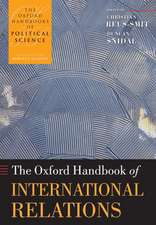International Organizations as Orchestrators
Editat de Kenneth W. Abbott, Philipp Genschel, Duncan Snidal, Bernhard Zanglen Limba Engleză Paperback – mar 2015
| Toate formatele și edițiile | Preț | Express |
|---|---|---|
| Paperback (1) | 287.36 lei 6-8 săpt. | |
| Cambridge University Press – mar 2015 | 287.36 lei 6-8 săpt. | |
| Hardback (1) | 512.99 lei 6-8 săpt. | |
| Cambridge University Press – 4 mar 2015 | 512.99 lei 6-8 săpt. |
Preț: 287.36 lei
Nou
Puncte Express: 431
Preț estimativ în valută:
54.98€ • 57.41$ • 45.41£
54.98€ • 57.41$ • 45.41£
Carte tipărită la comandă
Livrare economică 16-30 aprilie
Preluare comenzi: 021 569.72.76
Specificații
ISBN-13: 9781107442696
ISBN-10: 1107442699
Pagini: 450
Ilustrații: 16 b/w illus. 17 tables
Dimensiuni: 152 x 226 x 25 mm
Greutate: 0.59 kg
Editura: Cambridge University Press
Colecția Cambridge University Press
Locul publicării:New York, United States
ISBN-10: 1107442699
Pagini: 450
Ilustrații: 16 b/w illus. 17 tables
Dimensiuni: 152 x 226 x 25 mm
Greutate: 0.59 kg
Editura: Cambridge University Press
Colecția Cambridge University Press
Locul publicării:New York, United States
Cuprins
Part I. Introduction: 1. Orchestration: global governance through intermediaries Kenneth W. Abbott, Philipp Genschel, Duncan Snidal and Bernhard Zangl; Part II. Managing States: 2. Orchestrating policy implementation: EU governance through regulatory networks Michael Blauberger and Berthold Rittberger; 3. Orchestration on a tight leash: state oversight of the WTO Manfred Elsig; 4. Orchestration by design: the G20 in international financial regulation Lora Anne Viola; 5. Efficient orchestration? The Global Environment Facility in the governance of climate adaptation Erin R. Graham and Alexander Thompson; 6. Orchestrating monitoring: the optimal adaptation of international organizations Xinyuan Dai; 7. Orchestrating enforcement: international organizations mobilizing compliance constituencies Jonas Tallberg; Part III. Bypassing States: 8. WHO orchestrates? Coping with competitors in global health Tine Hanrieder; 9. Orchestrating peace? Civil war, conflict minerals, and the United Nations Security Council Virginia Haufler; 10. Governing where focality is low: UNEP and the Principles for Responsible Investment Cornis van der Lugt and Klaus Dingwerth; 11. Orchestration for the 'social partners' only: internal constraints on the ILO Lucio Baccaro; 12. Orchestrating the fight against anonymous incorporation: a field experiment Michael Findley, Daniel Nielson and J. C. Sharman; Part IV. Implications: 13. Orchestration along the Pareto frontier: winners and losers Walter Mattli and Jack Seddon; 14. Orchestrating global governance: from empirical findings to theoretical implications Kenneth W. Abbott, Philipp Genschel, Duncan Snidal and Bernhard Zangl.
Recenzii
'International Organizations as Orchestrators shows how both intergovernmental organizations and states can use intermediaries, and soft means, to attain their goals when hierarchy, delegation, and collaboration on equal terms are either infeasible or ineffective. Since its ideas are new and its arguments careful, this is one of the most important books on world politics to appear during the last several years.' Robert O. Keohane, Princeton University, New Jersey
'This is a terrific book, which explores how international organizations 'orchestrate' the activities of public and private actors, addressing large challenges with small resources. The editors clearly formulate the concept of orchestration, and a stellar group of contributors explores how IOs like the European Union and United Nations agencies orchestrate the action of diverse groups across a broad range of contemporary issues and problems. Essential reading for all students of global governance.' Mark Pollack, Jean Monnet Chair, Temple University, Philadelphia
'The editors of this outstanding volume orchestrate a set of well-known scholars from both sides of the Atlantic. Together, they significantly move forward our understanding of global governance by leaving behind the focus on single institutions and focusing instead on the interaction between different types of international actors such as states, international organizations and transnational private actors. This is social science at its best - theoretically ambitious and empirically grounded.' Michael Zürn, Wissenschaftszentrum Berlin für Sozialforschung and Freie Universität Berlin
'This is a terrific book, which explores how international organizations 'orchestrate' the activities of public and private actors, addressing large challenges with small resources. The editors clearly formulate the concept of orchestration, and a stellar group of contributors explores how IOs like the European Union and United Nations agencies orchestrate the action of diverse groups across a broad range of contemporary issues and problems. Essential reading for all students of global governance.' Mark Pollack, Jean Monnet Chair, Temple University, Philadelphia
'The editors of this outstanding volume orchestrate a set of well-known scholars from both sides of the Atlantic. Together, they significantly move forward our understanding of global governance by leaving behind the focus on single institutions and focusing instead on the interaction between different types of international actors such as states, international organizations and transnational private actors. This is social science at its best - theoretically ambitious and empirically grounded.' Michael Zürn, Wissenschaftszentrum Berlin für Sozialforschung and Freie Universität Berlin
Descriere
This book shows how international organizations achieve their governance goals, despite limited resources, by 'orchestrating' NGOs and other intermediaries.













